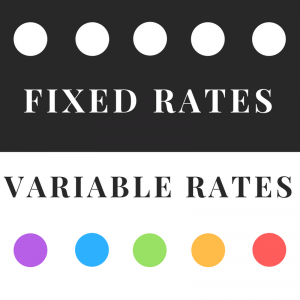 As you’re applying for college, you’ll most likely end up looking at student loans. Student loans are complicated enough, but what about the accompanying interest rates? Fixed rate and variable rate loans are another factor to look into before deciding on a student loan. The basic concept behind a fixed rate and a variable rate is pretty simple, but picking one can be a little more complicated. You must weigh the pros and cons of each before deciding to take either fixed rate or variable rate loans.
As you’re applying for college, you’ll most likely end up looking at student loans. Student loans are complicated enough, but what about the accompanying interest rates? Fixed rate and variable rate loans are another factor to look into before deciding on a student loan. The basic concept behind a fixed rate and a variable rate is pretty simple, but picking one can be a little more complicated. You must weigh the pros and cons of each before deciding to take either fixed rate or variable rate loans.
All federal student loans are fixed rate loans, but private student loans can be either fixed or variable.
Fixed Rate Loans
With fixed rate loans, the interest sets each year before July 1st. That rate remains fixed, meaning it won’t change or fluctuate over the course of that year. The next year, the rate of interest may or may not remain the same. But, whatever it is set at, it remains fixed for the whole year. If interest rates go up, your rate isn’t affected. However, that also means that if interest rates decrease, you won’t get to enjoy a lower rate.
When it is time to repay, you can calculate whether or not it works to your advantage to consolidate your loans into one single payment.
Variable Rate Loans
With variable rate loans, the interest rate will vary throughout the life of the loan. The interest rate that applied when you take the loan may not be the same when it is time to start repaying.
This may or may not be to your advantage, but there is no way of knowing for sure at the time when you are taking the loan. Lenders that offer both types of loans, typically quote lower interest rates on variable rate loans. However, just because the rate is lower, does not necessarily make variable rate loans a better option. Variable rates are in a state of flux, and will rise and fall along with the market—which is hard to predict. A variable rate loan may be better if you have a small loan or you definitely know you can repay the loan quickly. However, if you aren’t sure how quickly you can repay the loan, a variable rate is more of a gamble.
Which Should You Choose?
So how do you decide which one is better for you? It’s a tough decision to make, and you’ll have to decide how much of a risk you’re willing to take.
With a fixed rate loan, you will pay the same rate that you started off with. With a variable rate loan, the rate may end up being higher or lower than what you start off with.
One way to minimize the risks involved is to speak to an experienced financial advisor who can use their knowledge and understanding of borrowing trends over the past few years to make better judgments regarding future developments.






